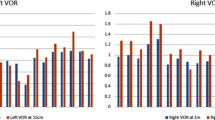Abstract
We tested the hypothesis that the reason some patients compensate well after unilateral vestibular deafferentation (uVD) and others do not could be due to differences in eye-head coordination or in blink characteristics during natural, active head movements. Patients with well-compensated uVDs do not report distressing postural unsteadiness or an aversive sensation of apparent motion of a visual scene (oscillopsia) or ”visual confusion” upon rapid head rotation as do those patients with poorly compensated uVDs. It has been suggested that well-compensated subjects eliminate the subjective sensations associated with retinal slip, which must occur as a result of an inadequate vestibuloocular reflex (VOR), either by restricting head movement to the lesioned side or by blinking during head turns. To test this, subjects stood at the curbside of a busy road with a 180o view of regular, fast-moving traffic, which they scanned in preparation of crossing the road, and their eye and head movements and blinks were measured in this natural situation. Both normals and uVDs generated similar ranges of head position, head velocity and gaze magnitude, and all subjects performed a blink during the gaze saccade. Contrary to the hypothesis, no systematic differences were found between normals and either group of uVDs.
Similar content being viewed by others
Author information
Authors and Affiliations
Additional information
Received: 8 May 1998 / Accepted: 19 June 1998
Rights and permissions
About this article
Cite this article
Black, R., Halmagyi, G., Curthoys, I. et al. Unilateral vestibular deafferentation produces no long-term effects. Exp Brain Res 122, 362–366 (1998). https://doi.org/10.1007/s002210050524
Issue Date:
DOI: https://doi.org/10.1007/s002210050524




